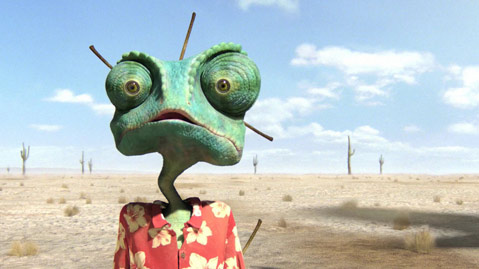Rango
Johnny Depp, Isla Fisher and Ned Beatty star in an animated film written by John Logan and directed by Gore Verbinski.

Strange as it might seem, Rango, a fun-loving, wild-ride variation on the Western genre, appears to be the first super-fine American film of 2011. As such, it feels like a promising harbinger of spring at the movies, after the annual drudgery of the first phase of the Hollywood release year. The fact that the film—enriched with cinematic references and cultural in-jokes that adults will appreciate—is also a box office smash, and animated, adds to its all-around lovability. Not coincidentally, two of the super-fine films of 2010, Toy Story 3 and Despicable Me, were also animated, leading us to wonder about the state and fate of the cinematic life beyond the live-action game.
That said, Rango distinguishes itself by juggling reassuring, cozy formulaic qualities with sly gags, the most ornate language in a Western since the Coens’ True Grit, and cinematic quips and quotes galore. Maybe the freshness has partly to do with this being the first animated feature for director Gore Verbinski (of the Pirates of the Caribbean franchise). For one, its cast of critter characters is uncommonly “ugly,” mangy, slimy, and snaggle-toothed. So much for the cute rodent paradigm passed down from Beatrix Potter to Disney to Pixar. At the story’s center is a displaced suburban chameleon (voiced by Johnny Depp) lost in the Mojave Desert, and taking on the role of the day-saving stranger in a troubled Western town called Dirt.
We know the adult population in the audience is being catered to in the movie’s first few minutes, with the inclusion of the words “epiphany” and “ironic.” Meanwhile, the kids get plenty of dazzling visuals, gross-out moments, and a David/Goliath-esque story of good battling forces of evil, including massive, fraudulent water diversion. The filmmakers have great fun slipping in references to Shakespeare and a range of films, from spaghetti Westerns to Chinatown, and even a fleeting sight-gag nod to Terry Gilliam’s Fear and Loathing in Las Vegas.
Late in the story, our Chameleon with No Name goes unconscious and lands in some Sergio Leone-inspired wasteland. “Are we in heaven?” he asks the obviously Eastwood-esque figure on the landscape. “No,” the figure snarls. “If we were, we’d be eating Pop-Tarts with Kim Novak.” The line may go right over the heads of kids in the house, but, in the end, it’s all good, and on multiple levels.



